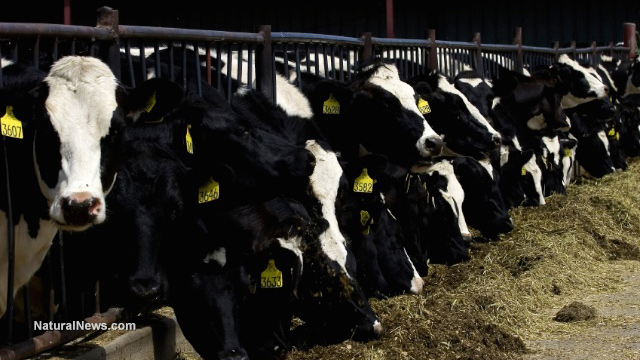93% of physicians are concerned about the massive overuse of antibiotics in agriculture
Tuesday, February 16, 2016 by: David Gutierrez, staff writer
Tags: antibiotic resistance, livestock agriculture, physicians

(NaturalNews) Ninety-three percent of all physicians surveyed are concerned about the overuse of antibiotics in animal agriculture, according to a recent survey conducted by the Consumer Reports National Research Center. The report is available here[PDF].
Researchers surveyed 500 internal medicine and family practice physicians about their thoughts on and experiences with antibiotic-resistant diseases. The report was released as part of the Prescription For Change project, a collaborative effort that includes Consumers Union (the policy and advocacy arm of Consumer Reports), Physicians for Social Responsibility, Health Care Without Harm, United States Public Interest Research Group (USPIRG), Natural Resources Defense Council, National Physicians Alliance and Healthy Food Action.
Some of the groups involved planned media events to coincide with the report's release, urging supermarkets and other large institutions to help end the use of antibiotics on healthy livestock.
"This poll underscores how important it is to preserve the effectiveness of antibiotics," said Jean Halloran, director of the Food Policy Initiatives at Consumers Union. "We're calling on supermarket chains -- which have huge leverage with meat producers -- to help end the overuse of antibiotics in livestock."
Major public health problem
Antibiotic-resistant infections are of growing concern to health experts worldwide. It is widely accepted that overuse of antibiotics is the major cause driving the evolution of drug-resistant bacteria and is responsible for their proliferation in recent years. This can be caused by the use of antibiotics not just in humans but also in livestock; factory farms in the United States regularly dose healthy animals with antibiotics in order to make them grow faster.Antibiotic-resistant infections now kill 23,000 per year in the United States.
The survey results were consistent with the perception that drug-resistant bacteria are a growing health problem. Eighty-five percent of doctors reported that they had treated someone with a confirmed or suspected antibiotic-resistant infection in the past year. Of those, 35 percent said they had a patient die or suffer serious complications from a drug-resistant infection. Among doctors working in both hospital and outpatient settings, nearly 50 percent had a patient die or suffer serious complications.
A whopping 97 percent of doctors said they were concerned that drug-resistant infections are a growing problem, and 80 percent said they worked with a practice, hospital or medical group that was actively trying to minimize overprescription of antibiotics.
FDA action unlikely
According to USPIRG spokesperson Maggie Oliver, efforts to combat routine antibiotic use in Wisconsin farms have been well received by local small farmers."What we've seen for the most part is overwhelming support for this," she said. "Wisconsin is a huge agricultural state, but so many small farmers that I've spoken with are completely with us on this issue and agree that antibiotics should be saved for cases where they're really needed."
But wide-scale change is most likely to come from federal action, Oliver said.
"We're thinking any way to stop the overuse, really, but that would probably be most effective coming from the federal level, so we're really calling on the Obama administration here to take the action and require the FDA to stop giving antibiotics to animals that aren't sick," she said.
Unfortunately, the FDA has been less than an ally to those working to phase out the practice of routine antibiotic use in livestock. Earlier this year, the Natural Resources Defense Council (NRDC) exposed evidence that the FDA has allowed 18 animal antibiotics to stay on the market even knowing that they posed "high risk" of contributing to drug-resistant infections in humans.
"The FDA's failure to act on its own findings about the 30 reviewed antibiotic feed additives is part of a larger pattern of delay and inaction in tackling livestock drug use that goes back four decades," said NRDC attorney and study co-author Avinash Kar.
Sources for this article include:
http://www.foodsafetynews.com
http://pressroom.consumerreports.org
http://www.naturalnews.com
http://wixx.com
http://science.naturalnews.com
Antibiotic resistance at FETCH.news
Get independent news alerts on natural cures, food lab tests, cannabis medicine, science, robotics, drones, privacy and more.
Take Action: Support Natural News by linking to this article from your website
Permalink to this article:
Embed article link: (copy HTML code below):
Reprinting this article:
Non-commercial use OK, cite NaturalNews.com with clickable link.
Follow Natural News on Facebook, Twitter, Google Plus, and Pinterest
- Newly released JFK files reveal Pentagon's role in creating Lyme disease and covid in the same lab
- Trump nominates VACCINE ZEALOT Susan Monarez to lead the CDC, sidelining RFK Jr.'s reform efforts
- Trump's greatest betrayal so far: Accelerating Middle East wars, silencing dissent, and serving Zionist masters
- STARDUST, a secretive Israeli-US startup, plans risky solar geoengineering experiment to BLOCK OUT THE SUN
- Trump shows his true colors
- $2B Roundup verdict: A landmark blow to Bayer and a win for health freedom
- Festive flavors: The sweet history, nutritional profile and health benefits of pecan pie
- Elon Musk: Aliens could be here on Earth RIGHT NOW
- Dr. Mike Yeadon releases 15-minute testimony - WATCH - about genocidal intent of COVID “vaccines”
- California's social media censorship law struck down: A victory for free speech or a threat to online safety?
- HUGE: Putin claims 2020 election fraud in U.S. sparked Ukraine war, calls for peace talks with Trump
- Sugarcane extract superior to cholesterol-lowering drugs?
- Reclaim your health: How midlife exercise reverses years of inactivity
- Chris Rufo finally reveals abuse liberals unleashed on his wife and young kids...
- Pilots report mysterious lights 'moving at extreme speeds' across Oregon skies
- “Forever chemicals” in drinking water drive alarming cancer surge, new study warns
- SWEET SABOTAGE: CIA's secret war on Soviet sugar revealed in JFK files
- Florida takes a stand: DeSantis proposes permanent ban on mRNA vaccine mandates
- Newly released JFK files reveal Pentagon's role in creating Lyme disease and covid in the same lab
- Elon Musk: Aliens could be here on Earth RIGHT NOW
- Reclaim your health: How midlife exercise reverses years of inactivity
- Trump reverses course on Gaza plan, says “nobody is expelling Palestinians”
- EPA advisor admits the agency is funneling billions to climate groups ahead of Trump’s return to White House
- Big Pharma's $8 Billion bribery scheme exposed: how doctors are pushed to prescribe junk science, not heal
- Space war brewing? Russia threatens to destroy Starlink satellites
- A lack of integrity in Academia: Harvard professor found GUILTY of fraudulent research to promote CRT theory
- Survival 101: Effective EMF blocking techniques
- Rep. Nancy Mace introduces bill to ban biological males from female facilities on federal property
- Mike Adams Sermon 66: God will DESTROY ISRAEL for its wickedness
- Pilots report mysterious lights 'moving at extreme speeds' across Oregon skies
- 5 Simple steps to boost your brainpower: How to strengthen executive function in a distracted world
- Historian warns Israel may be entering an “IRREMEDIABLE DECLINE”
- Florida takes a stand: DeSantis proposes permanent ban on mRNA vaccine mandates
- RFK Jr.'s SSRI antidepressant investigation sparks liberal meltdown, exposes Big Pharma's dangerous game
- OpenAI whistleblower who dissented against how the company trained ChatGPT found dead
- Sugarcane extract superior to cholesterol-lowering drugs?
- EPA advisor admits the agency is funneling billions to climate groups ahead of Trump’s return to White House
- The Health Ranger releases “Vaccine Zombie” song and music video, using AI-animated zombies for the music video
- California's social media censorship law struck down: A victory for free speech or a threat to online safety?
- Dr. Mike Yeadon releases 15-minute testimony - WATCH - about genocidal intent of COVID “vaccines”
- The pandemic as a tool for INDOCTRINATION: Understanding “The Indoctrinated Brain” by Dr. Michael Nehls
- Mike Adams releases country western hit single: Goin’ Back in Time is Comin’ Home
- Mike Adams releases music poetry sensation: A Child of God
- RFK Jr. clears key hurdle: Sen. Susan Collins backs controversial HHS nominee, signaling a new era for health policy
- Florida takes a stand: DeSantis proposes permanent ban on mRNA vaccine mandates
- Unpacking the Lies That We’ve Been Fed – new song and music video released by Mike Adams, the Health Ranger
- Mike Adams releases new song and music video: Nothing More Disgusting Than a Globalist
- Congratulations to the FULLY UNVACCINATED as you resisted the COVID-19 PROPAGANDA MACHINE fueled by over $100 BILLION
- “Why we influenced the 2020 elections”: Facebook files reveal the coordinated effort to bury the Hunter Biden laptop story
- Michigan sheriff announces criminal investigation into 2020 election crimes, Dominion Voting Systems
- Israeli soldiers accused of even more torture and abuse in the West Bank
- Migrants are taking advantage of recent hurricanes to scam residents and loot their homes
- House Intelligence Committee calls for the ARREST and PROSECUTION of Dr. Anthony Fauci
- Peter Rost exposes Big Pharma corruption in his book “The Whistleblower: Confessions of a Healthcare Hitman”
- Red Cross issues warning to stop blood plasma donations from vaccinated people
- Scientists confirm: GENIUS brain function can be spontaneously unleashed in humans without any apparent cause
- EPA advisor admits the agency is funneling billions to climate groups ahead of Trump’s return to White House
- HYSSOP: What research reveals about the health benefits of this ancient holy herb
- Two containers with completed ballots fall out of truck in Florida
- Fully vaccinated about to see “tsunami” of illness and death, warns virologist
- Global leaders unite to clamp down on “misinformation” with UN-backed Cascais Declaration
- BREAKING: 2025 NDAA authorizes mandatory military draft of WOMEN across America… as Pentagon pursues global NUCLEAR war with both Russia and China at the same time
- Michael Yon warns of a ZIONIST TAKEOVER in Trump’s second administration
- BOMBSHELL: DNA testing kits are a SCAM to develop ethnic-specific bioweapons
- Ozempic and Wegovy weight loss drugs are injectable LIZARD VENOM PEPTIDES that may unleash a devastating wave of organ failure… side effects align with symptoms of SNAKE BITES
- Israeli soldiers accused of even more torture and abuse in the West Bank
- These 13 countries just signed an agreement to engineer a global FAMINE by destroying food supply
- NASA admits that climate change occurs because of changes in Earth’s solar orbit, and NOT because of SUVs and fossil fuels
- RFK Jr. clears key hurdle: Sen. Susan Collins backs controversial HHS nominee, signaling a new era for health policy
- Sermon 30: How Jesus reveals Caesar’s FAKE CURRENCY and FALSE AUTHORITY
- Coriander seeds: Ancient medicine backed by modern science
- Arizona officials claim Maricopa County needs 10-13 days to tabulate results of the election
Science News & Studies
Medicine News and Information
Food News & Studies
Health News & Studies
Herbs News & Information
Pollution News & Studies
Cancer News & Studies
Climate News & Studies
Survival News & Information
Gear News & Information
News covering technology, stocks, hackers, and more



"Big Tech and mainstream media are constantly trying to silence the independent voices that dare to bring you the truth about toxic food ingredients, dangerous medications and the failed, fraudulent science of the profit-driven medical establishment.
Email is one of the best ways to make sure you stay informed, without the censorship of the tech giants (Google, Apple, Facebook, Twitter, YouTube, etc.). Stay informed and you'll even likely learn information that may help save your own life."
–The Health Ranger, Mike Adams












































